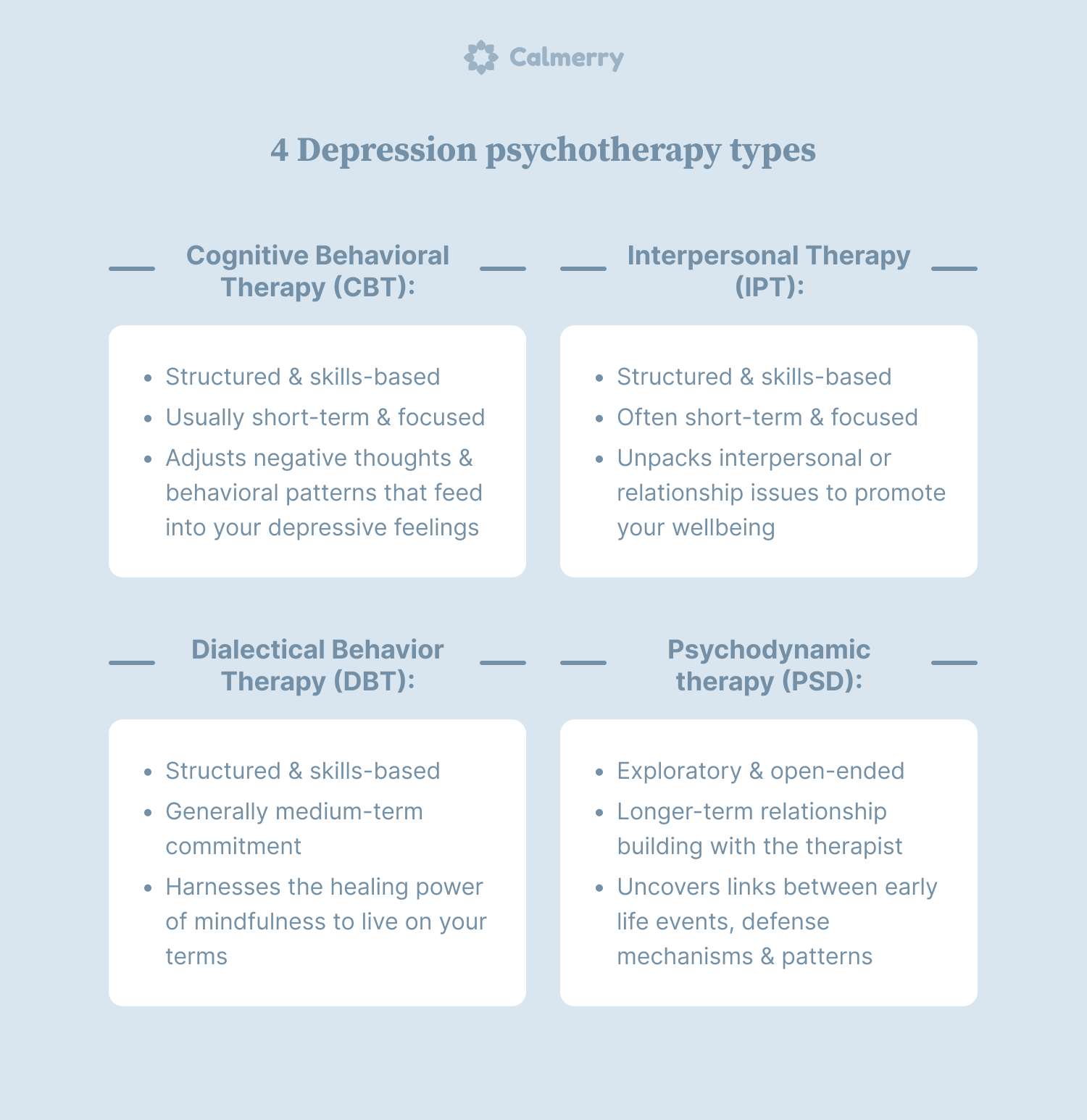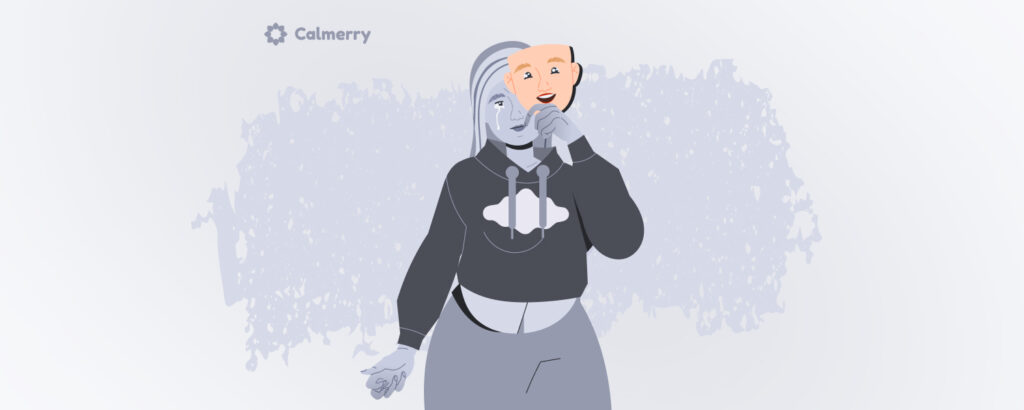Types of Psychotherapy for Depression

In this article
You’re feeling down, struggling in your relationships, and dissatisfied with your job. It seems you’re in a dense fog. Your clothes aren’t fitting quite right these days; maybe it’s hard to squeeze into them. Or you are hanging loosely on your body.
Your mind is filled with negative thoughts or feelings of guilt, and you’re not enjoying all the things you used to do that make you who you are. These are the signs of depression.
Understanding depression
There are many different ways that a person can experience depression. Symptoms may include:
- Feelings of sadness, hopelessness, emptiness, worthlessness, guilt
- Loss of interest, motivation, energy
- Disturbances in sleep, concentration, eating habits
- Thoughts of death or suicide
The common thread is that the symptoms become intrusive enough that they get in the way of your daily life.
When you’re dealing with depression, even something that used to feel really simple, like changing your clothes or journaling, can become overwhelming. Sometimes you may even feel so bad that you think about taking your own life. It’s a scary thing to experience and all too common.
Hundreds of millions of people experience depression worldwide, and a study shows rates of depression have been on the rise since the pandemic hit.
The good news is: depression is treatable, and psychotherapy, also known as talk therapy, is an accessible, first-line treatment for depression.
What type of therapy is right for you?
Looking for the right therapist can be confusing and intimidating. You will trust this person to steadily shepherd you back to yourself. Knowing which form of psychotherapy you want to try is a good place to start. One popular form of psychotherapy, often referred to as talk therapy, involves open and supportive discussions with a therapist.
If you’re ready to get help but don’t know what to choose, this article will walk you through various types of psychotherapy for depression, so you can understand the differences and feel empowered to choose the right one for you.

Cognitive behavioral therapy
Have you ever looked at yourself in the mirror and thought, “I look terrible”? “I hate XYZ part of me?”. In CBT terms, this would be called an “automatic thought.” Now imagine how you would feel at that moment. Probably, pretty crummy. How would that impact what you do next?
In CBT, you’ll explore how your thoughts, behaviors, and feelings are all interconnected. It is a skills-based treatment for depression that focuses on changing your thought and behavior patterns. Therapy is often short-term, and you’ll tend to focus on specific issues in a structured way.
You’ll work with your therapist to understand how your negative thoughts affect your feelings and behavioral patterns, which loop back to affect your thoughts. Together you’ll then develop new ways of responding to difficult situations so that you can get out of the negative and harmful cycle.
With the help of CBT, you might have that same negative thought while looking in the mirror and then say to yourself: “I’m not happy with the way I look right now. I might not be perfect. But I’m working on it, and I can still love myself. People care about me, and I’m worthy of love”.
Quick review of CBT
- Structured & skills-based
- Usually short-term & focused
- Adjusts negative thoughts & behavioral patterns that feed into your depressive feelings
Dialectical behavior therapy
DBT is a mindfulness-based psychotherapy that teaches nonjudgmental, present-moment awareness to better cope with challenging feelings, including deep suffering.
Like CBT, Dialectical Behavior Therapy is skills-based and includes structured activities and homework between sessions. Using mindfulness, you’ll work on changing harmful behaviors and thought patterns while developing healthy relationship skills.
In addition to other depression symptoms, DBT has been shown to reduce suicidal thinking and self-harming behavior. When you are having trouble managing your negative emotions, DBT can help you to develop coping strategies. And you can ride the waves of your negative emotions and live life on your terms.
DBT is a great place to start when other treatment methods haven’t been effective.
Quick review of DBT
- Structured & skills-based
- Generally medium-term commitment
- Harnesses the healing power of mindfulness to live on your terms
Interpersonal therapy
As its name suggests, Interpersonal Therapy, or IPT, is a structured, short-term psychotherapy for depression that focuses on your relationships.
Whether you’re dealing with grief, the loss of a loved one, a breakup, a massive argument, a move to a new place, or some other life transition, IPT can help you to feel more connected.
In therapy, you’ll explore your relationship patterns and home in on a specific current issue that you are dealing with. Your therapist will support you in developing the skills to assert your needs and better manage this problem.
The idea behind IPT is that improving your interpersonal skills and developing a strong support system can increase your self-esteem. And the sense of connectedness while buffering against the harmful symptoms of depression.
Quick review of IPT
- Structured & skills-based
- Often short-term & focused
- Unpacks interpersonal or relationship issues to promote your wellbeing
Psychodynamic therapy
When you first think of treatment for depression, you might also think of the famous psychoanalyst Sigmund Freud. Psychodynamic therapy originated with Freud and is also sometimes called insight-oriented therapy because it involves looking back into your childhood to help you understand yourself.
It is less structured than other forms of psychotherapy, so you have plenty of room to freely associate and make connections between the difficult things that you experienced in your past and the way you cope with challenges now.
You’ll work with your therapist to identify your defense mechanisms and relationship issues. Your therapist will also help you to uncover important information about yourself that shows up during your interactions in therapy.
The idea behind the psychodynamic approach is that as you identify recurring patterns in your life and develop your ability to self-reflect. You are better able to know what your stumbling blocks are and develop the tools to address them.
Quick review of Psychodynamic therapy
- Exploratory & open-ended
- Longer-term relationship building with the therapist
- Uncovers links between early life events, defense mechanisms & patterns
Conclusion
Finding the right form of psychotherapy for depression is a delicate process, and there is no right answer for everyone. What’s important is that you try the type that feels the most accessible and appealing to you. And now more than ever you have the option to access high-quality, evidence-based psychotherapy from your couch, desk, comfy chair, or meditation cushion.
Gone are the days of needing to commute to and from your therapy appointment or wait for a nearby therapist to have openings. Online therapy at Calmerry allows you to seek support in your real-life setting while maintaining the same effectiveness of face-to-face treatment.
It can be devastating to live with depression. When it’s hard to get out of bed, it might feel impossible to get to a therapist’s office. Treatment is out there, you don’t have to travel, and it is possible to recover.
online therapy
live video session


